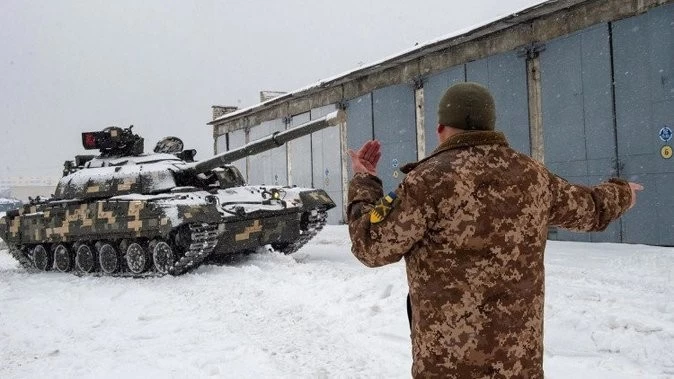The developments in Ukraine are ringing alarm bells globally. About 100,000 Russian soldiers are standing on the border with Ukraine and US military sources fear that Russia is about to attack Ukraine. US citizens living in Ukraine have been advised by the US government to leave Ukraine, as war could break out there. What is even more worrying is that the Russian army is conducting exercises with the Belarusian army on its borders in the north of Ukraine.
About 70,000 US troops are permanently stationed in Europe. About half of them are in Germany. The Unified European Command headquarters of the US Army is in Stuttgart. The military oversees five military gatherings in Germany and the Air Force's European operations are headquartered at Rammstein Airbase. In addition to permanent troops, 7,000 additional US troops are in Europe on short-shift deployments as part of a NATO support mission called Atlantic Resolution.
These include an aviation division with 85 helicopters, an armored division with artillery and tanks. Those troops are headquartered in Pozna, Poland.
Although the US does not anticipate any armed conflict with Russian troops, as Ukraine is not part of NATO, it has moved about 5,000 troops to Ukraine's neighboring countries, namely Romania and Belarus. And maybe even in Poland.
Indeed, the main point of contention is that Russia cannot allow Ukraine to become part of NATO, because according to its assessment, the proximity of NATO troops and surface-to-surface missiles would pose an imminent threat to Russian territory. While the demand for Ukraine's inclusion in NATO has been raised by several EU members, mainly because of a proposal made by the current Ukrainian leadership to take advantage of NATO's protective umbrella.
In fact, Ukraine fears the possibility of Russian annexation of its territories like Crimea. In 2014, Russia occupied parts of Ukraine. Ukraine's leadership also fears Russia will retake parts of the southeast region to facilitate a land route to Crimea. Ukraine is the second largest country in Europe by area after Russia, bordering it to the east and northeast.
Ukraine was a major player in the socialist movement. Many members of the Soviet leadership came from Ukraine, most notably Nikita Khrushchev and Leonid Brezhnev, who were Soviet leaders from 1964 to 1982. Apart from this, many prominent Soviet players, scientists and artists were from Ukraine. In 1954, Russian-populated Crimea was transferred from Russia to the Ukrainian Soviet Republic.
On August 24, 1991, Ukraine seceded from the Soviet Union and declared itself an officially independent nation. And then the Soviet Union also ceased to exist on 26 December, when the presidents of Ukraine, Belarus and Russia (founding members of the Soviet Union) met to formally dissolve the union, in accordance with the Soviet constitution. But despite these changes some remnants of the then Soviet Union can still be found within Ukraine.
At first, the majority of the population of eastern Ukraine and Crimea were Russians, who continued to have an affinity for Russia. And this was the main reason that Russia did not face any opposition in annexing Crimea. In the Soviet Union period, a number of high technology armament and military shipping industries were established in eastern Ukraine and which were dormant.
After the dissolution of the Soviet Union, Ukrainian authorities had over a thousand nuclear weapons in the Soviet arsenal, which were sent to Russia to be destroyed. In addition to the Russia-Ukraine military confrontation now, there is a very strong separatist movement going on in eastern Ukraine, threatening an unstable armed conflict. It is alleged that the armed conflict is being promoted by the Russian military.
Western Ukraine has involved Western countries politically and through commercial ventures and is seen as leaning towards the US. The only relief in this case is that there have been several meetings between European and Russian leaders, most notably the dialogue between Biden and Putin. The Chinese regime, on the other hand, has clearly sided with the Russian leadership.
The Indian government is caught in a dilemma in this matter, which it is trying to resolve diplomatically, although India refrained from voting against Russia in the discussion on the issue in the UN Security Council. India's relations with Russia have been friendly since the time of the Soviet Union. The supply of arms to India from Russia is important, especially when Chinese troops are stationed on the borders of Ladakh.
Although India has diversified significantly over the years by relying on France and Israel to source its arms imports, it continues to source its aerospace, small arms, armor materials from Russia. India has recently signed a contract with Russia to manufacture assault rifles in Indian factories.
This is a small part of about 60 per cent of Indian imports. Apart from this, nuclear ores and special metals are also supplied to India from Russia. Russia also has to keep the spirit of reciprocity in mind, as its economy is dependent on arms exports to India.


